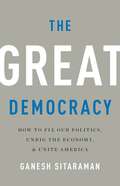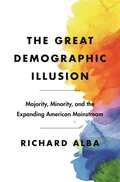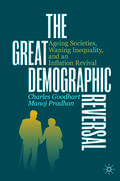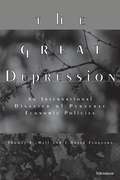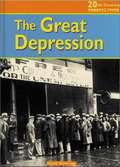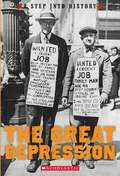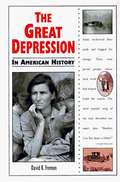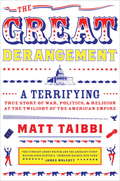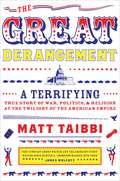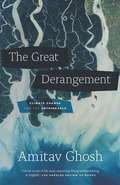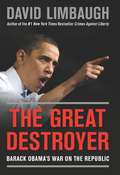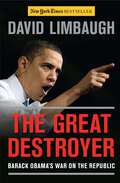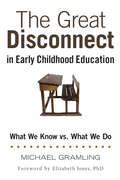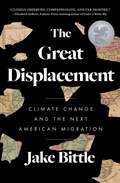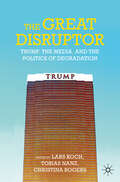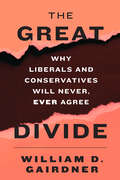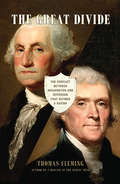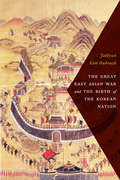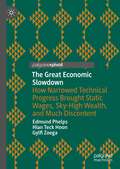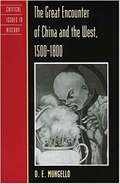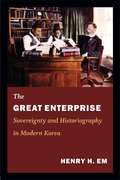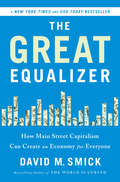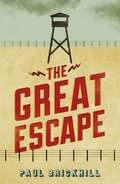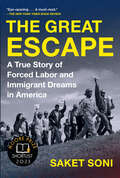- Table View
- List View
The Great Democracy: How to Fix Our Politics, Unrig the Economy, and Unite America
by Ganesh SitaramanA leading progressive intellectual offers an agenda for how real democracy can triumph in America and beyondSince the New Deal in the 1930s, there have been two eras in our political history: the liberal era, stretching up to the 1970s, followed by the neoliberal era of privatization and austerity ever since. In each period, the dominant ideology was so strong that it united even partisan opponents. But the neoliberal era is collapsing, and the central question of our time is what comes next. As acclaimed legal scholar and policy expert Ganesh Sitaraman argues, two political visions now contend for the future. One is nationalist oligarchy, which rigs the system for the rich and powerful while using nationalism to mobilize support. The other is the great democracy, which fights corruption and extends both political and economic power to all people. At this decisive moment in history, The Great Democracy offers a bold, transformative agenda for achieving real democracy.
The Great Demographic Illusion: Majority, Minority, and the Expanding American Mainstream
by Richard AlbaWhy the number of young Americans from mixed families is surging and what this means for the country’s future Americans are under the spell of a distorted and polarizing story about their country’s future―the majority-minority narrative―which contends that inevitable demographic changes will create a society with a majority made up of minorities for the first time in the United States’s history. The Great Demographic Illusion reveals that this narrative obscures a more transformative development: the rising numbers of young Americans from ethno-racially mixed families, consisting of one white and one nonwhite parent. Examining the unprecedented significance of mixed parentage in the twenty-first-century United States, Richard Alba looks at how young Americans with this background will play pivotal roles in the country’s demographic future.Assembling a vast body of evidence, Alba explores where individuals of mixed parentage fit in American society. Most participate in and reshape the mainstream, as seen in their high levels of integration into social milieus that were previously white dominated. Yet, racism is evident in the very different experiences of individuals with black-white heritage. Alba’s portrait squares in key ways with the history of immigrant-group assimilation, and indicates that, once again, mainstream American society is expanding and becoming more inclusive.Nevertheless, there are also major limitations to mainstream expansion today, especially in its more modest magnitude and selective nature, which hinder the participation of black Americans and some other people of color. Alba calls for social policies to further open up the mainstream by correcting the restrictions imposed by intensifying economic inequality, shape-shifting racism, and the impaired legal status of many immigrant families.Countering rigid demographic beliefs and predictions, The Great Demographic Illusion offers a new way of understanding American society and its coming transformation.
The Great Demographic Reversal: Ageing Societies, Waning Inequality, and an Inflation Revival
by Charles Goodhart Manoj PradhanThis original and panoramic book proposes that the underlying forces of demography and globalisation will shortly reverse three multi-decade global trends – it will raise inflation and interest rates, but lead to a pullback in inequality. “Whatever the future holds”, the authors argue, “it will be nothing like the past”. Deflationary headwinds over the last three decades have been primarily due to an enormous surge in the world’s available labour supply, owing to very favourable demographic trends and the entry of China and Eastern Europe into the world’s trading system. This book demonstrates how these demographic trends are on the point of reversing sharply, coinciding with a retreat from globalisation. The result? Ageing can be expected to raise inflation and interest rates, bringing a slew of problems for an over-indebted world economy, but is also anticipated to increase the share of labour, so that inequality falls. Covering many social and political factors, as well as those that are more purely macroeconomic, the authors address topics including ageing, dementia, inequality, populism, retirement and debt finance, among others. This book will be of interest and understandable to anyone with an interest on where the world’s economy may be going.
The Great Depression
by Thomas E. Hall J. David FergusonThe Great Depression was the worst economic catastrophe in modern history. Not only did it cause massive worldwide unemployment, but it also led to the rise of Adolf Hitler in Germany, World War II in Europe, and the tragic deaths of tens of millions of people. This book describes the sequence of policy errors committed by powerful, well-meaning people in several countries, which, in combination with the gold standard in place at the time, caused the disaster. In addition, it details attempts to reduce unemployment in the United States by Franklin Roosevelt's New Deal, and in Germany by Hitler's National Socialist economic policies. A comprehensive economic and historical explanation of the events pertaining to the Depression, this book begins by describing the economic setting in the major industrialized countries during the 1920s and the gold standard that linked theory economies together. It then discusses the triggering event that started the economic decline--the Federal Reserve's credit tightening in reaction to perceived overspeculation in the U. S. stock market. The policy bungling that transformed the recession into the Great Depression is detailed: Smoot Hawley, the Federal Reserve's disastrous adherence to the real bills doctrine, and Hoover's 1932 tax hike. This is followed by a detailed description of the New Deal's shortcomings in trying to end the Depression, along with a discussion of the National Socialist economic programs in Germany. Finally, the factors that ended the Depression are examined. This book will appeal to economists, historians, and those interested in business conditions who would like to know more about the causes and consequences of the Great Depression. It will be particularly useful as a supplementary text in economic history courses. Thomas E. Hall and J. David Ferguson are both Professors of Economics, Miami University.
The Great Depression (20th Century Perspectives)
by David DowningThrough this book, readers will learn: why October 29, 1929, is known as "Black Tuesday"; what the "Dust Bowl" was and how it added to the misery of the Great Depression; and what President Roosevelt's "New Deal" programs accomplished.
The Great Depression (A Step Into History)
by Steven OtfinoskiWhen the stock market crashed in October 1929, The world's economy was thrown into disarray. For the next decade, the great Depression left millions of Americans without jobs and forced countless businesses to close. Readers will discover how people struggled to make a living in a time of high unemployment, how the government tried to solve the country's economic troubles and much more.
The Great Depression in American History
by David K. FremonThis is a description of the history surrounding the Great Depression, highlighting the causes and key figures.
The Great Derangement: A Terrifying True Story of War, Politics, and Religion
by Matt TaibbiFunny, smart, and a little bit heartbreaking, "The Great Derangement" is an audaciously reported, sobering, and illuminating portrait of America at the end of the Bush era.
The Great Derangement: A Terrifying, True Story of War, Politics, and Religion at the Twilight of the American Empire
by Matt TaibbiIn describing the post-9/11 era, Taibbi ended up vomiting demons in an evangelical church in Texas, riding the streets of Baghdad in a convoy to nowhere, following a pork trail through Congress, and falling into the rabbit hole of the 9/11 Truth Movement. He tells the story of this new American madness by inserting himself into four defining American subcultures: THE MILITARY, THE SYSTEM, THE RESISTANCE, and THE CHURCH. Together these four interwoven adventures paint a portrait of a nation dangerously our of touch with reality and manically searching for answers in all the wrong places.
The Great Derangement: Climate Change and the Unthinkable (Berlin Family Lectures)
by Amitav GhoshAre we deranged? The acclaimed Indian novelist Amitav Ghosh argues that future generations may well think so. How else to explain our imaginative failure in the face of global warming? In his first major book of nonfiction since In an Antique Land, Ghosh examines our inability--at the level of literature, history, and politics--to grasp the scale and violence of climate change. The extreme nature of today's climate events, Ghosh asserts, make them peculiarly resistant to contemporary modes of thinking and imagining. This is particularly true of serious literary fiction: hundred-year storms and freakish tornadoes simply feel too improbable for the novel; they are automatically consigned to other genres. In the writing of history, too, the climate crisis has sometimes led to gross simplifications; Ghosh shows that the history of the carbon economy is a tangled global story with many contradictory and counterintuitive elements. Ghosh ends by suggesting that politics, much like literature, has become a matter of personal moral reckoning rather than an arena of collective action. But to limit fiction and politics to individual moral adventure comes at a great cost. The climate crisis asks us to imagine other forms of human existence--a task to which fiction, Ghosh argues, is the best suited of all cultural forms. His book serves as a great writer's summons to confront the most urgent task of our time.
The Great Destroyer: Barack Obama's War on the Republic
by David LimbaughWhen it comes to our prosperity, our freedom tradition, and our constitutional government, President Barack Obama has been the great destroyer - knocking down the free-market economy and principles of limited government that have made America the envy of the world. So argues David Limbaugh in his blockbuster new book, The Great Destroyer. In this highly-anticipated sequel to his #1 New York Times bestseller, Crimes Against Liberty, Limbaugh unveils the reality behind the administration's rhetoric and makes the case that the Obama administration is a real and present danger to America's future. The Great Destroyer shows how President Obama has unleashed a series of unchecked attacks on every aspect of America's way of life. Citing detailed examples, Limbaugh exposes the administration's reckless use of executive orders, unprecedented recess appointments, and shameful groveling to foreign leaders. In The Great Destroyer you'll learn: The true costs of Obama's crony capitalism scandals - it's even worse than you think; How Obama spends our economy into oblivion while relentlessly demonizing those who try to stop the bleeding; How the Obama administration has repeatedly, almost systematically, violated the Constitution to achieve its goals; How the Obama administration has empowered shadowy unelected bureaucrats to determine how we live, and the successes they already have in doing that; and much more. Devastating and compelling, there is no more comprehensive indictment of the Obama administration as it seeks re-election than The Great Destroyer. It is a book that every American worried about the future of our country must read.
The Great Destroyer: Barack Obama's War on the Republic
by David LimbaughIn his #1 New York Times bestseller Crimes Against Liberty, David Limbaugh penned a damning indictment of President Barack Obama's misrule during his first two years in office. In Limbaugh's blockbuster new book, The Great Destroyer, he sets his sights on the remainder of Obama's presidency revealing President Obama's latest crimes against liberty. Exposing Obama's counterfeit image as a champion of bipartisan compromise, Limbaugh relates in shocking detail how the president resorts to class-warfare demagoguery to advance a stunningly ideological agenda. The Great Destroyer also reveals how Obama's left-wing policies have become increasingly destructive to the nation, putting America on a collision course with fiscal ruin and international powerlessness. We must drastically change course, Limbaugh argues, or else our country will fall into an abyss that could take generations from which to escape. Controversial, compelling, and original, The Great Destroyer ingeniously picks up where Crimes AgainstLiberty left off, and is Limbaugh's most powerful book yet.
The Great Disconnect in Early Childhood Education
by Michael Gramling Elizabeth JonesEarly childhood educators need to be cognizant of the disconnect between public policy and classroom practice--the success of children they teach depends on it. This book analyzes how ineffective practices are driven by unexamined public policies and why educators need to challenge their thinking in order to make a difference in children's lives. A very complex story about public policy and the importance of teaching is told while entertaining and engaging the reader throughout.Michael Gramling is an expert in providing family literacy training and positive guidance training and has conducted experiential supervisor and mentor coach institutes for Head Start programs.
The Great Displacement: Climate Change and the Next American Migration
by Jake BittleShortlisted for the 2024 Carnegie Medal for Excellence &“The Great Displacement is closely observed, compassionate, and far-sighted.&” —Elizabeth Kolbert, Pulitzer Prize–winning author of Under a White Sky The untold story of climate migration in the United States—the personal stories of those experiencing displacement, the portraits of communities being torn apart by disaster, and the implications for all of us as we confront a changing future.Even as climate change dominates the headlines, many of us still think about it in the future tense—we imagine that as global warming gets worse over the coming decades, millions of people will scatter around the world fleeing famine and rising seas. What we often don&’t realize is that the consequences of climate change are already visible, right here in the United States. In communities across the country, climate disasters are pushing thousands of people away from their homes.A human-centered narrative with national scope, The Great Displacement is &“a vivid tour of the new human geography just coming into view&” (David Wallace-Wells, New York Times bestselling author of The Uninhabitable Earth). From half-drowned Louisiana to fire-scorched California, from the dried-up cotton fields of Arizona to the soaked watersheds of inland North Carolina, people are moving. In the last few decades, the federal government has moved tens of thousands of families away from flood zones, and tens of thousands more have moved of their own accord in the aftermath of natural disasters. Insurance and mortgage markets are already shifting to reflect mounting climate risk, pricing people out of risky areas. Over the next fifty years, millions of Americans will be caught up in this churn of displacement, forced inland and northward in what will be the largest migration in our country&’s history. The Great Displacement compassionately tells the stories of those who are already experiencing life on the move, while detailing just how radically climate change will transform our lives—erasing historic towns and villages, pushing people toward new areas, and reshaping the geography of the United States.
The Great Disruptor: Trump, the Media, and the Politics of Degradation
by Lars Koch Tobias Nanz Christina RogersThe January 6 attack on the U.S. Capitol was the peak of Donald Trump&’s populist strategy during his first term. His goal was to gain support through confrontation and by portraying others as enemies. This book examines Trump&’s public image from a culture and media studies perspective. It explores how his political style during his rise to the presidency was shaped by social conflicts, how he escalated these tensions, and how he benefited from polarization. The contributions focus on Trump&’s first term, highlighting how his rhetoric during the Black Lives Matter movement and the COVD-19 crisis, as well as his promotion of conspiracy theories and attacks on political institutions, pushed American society to the brink of civil war. They discuss Trump&’s use of media and his politics of emotion, framing him as the &“Great Disruptor&” in the context of popular culture, fragmented public discourse, and aggressive rhetoric.
The Great Divide
by William D. GairdnerThe theme of The Great Divide is that the populations of the democratic world, from Boston to Berlin, Vancouver to Venice, are becoming increasingly divided from within, due to a growing ideological incompatibility between modern liberalism and conservatism. This is partly due to a complex mutation in the concept of liberal democracy itself, and the resulting divide is now so wide that those holding to either philosophy on a whole range of topics: on democracy, on reason, on abortion, on human nature, on homosexuality and gay marriage, on freedom, on the role of courts ... and much more, can barely speak with each other without outrage (the favorite emotional response from all sides). Clearly, civil conversation at the surface has been failing -- and that could mean democracy is failing.This book is an effort to deepen the conversation. It is written for the non-specialist, and aims to reveal the less obvious underlying ideological forces and misconceptions that cause the conflict and outrage at the surface -- not with any expectation the clash of values will evaporate, but rather that a deeper understanding will generate a more intelligent and civil conversation. As an aid to understanding, the book contains a handful of Tables directly comparing modern liberal and conservative views across a range of fundamental moral and political "issues" so that curious readers can answer the book's main question: "Where Do You Stand?" An interesting result in testing this exercise has been the number of people who find they "think" one way, but "live" another.
The Great Divide: The Conflict between Washington and Jefferson that Defined a Nation
by Thomas FlemingHistory tends to cast the early years of America in a glow of camaraderie, when there were, in fact, many conflicts between the Founding Fathers--none more important than the one between George Washington and Thomas Jefferson. Their disagreement centered on the highest, most original public office created by the Constitutional Convention: the presidency. It also involved the nation’s foreign policy, the role of merchants and farmers in a republic, and the durability of the union. At its root were two sharply different visions of the nation’s future. Acclaimed historian Thomas Fleming examines how the differing characters and leadership styles of Washington and Jefferson shaped two opposing views of the presidency--and the nation. This clash profoundly influenced the next two centuries of America’s history and persists in the present day.
The Great East Asian War and the Birth of the Korean Nation
by JaHyun Kim HaboushThe Imjin War (1592–1598) was a grueling conflict that wreaked havoc on the towns and villages of the Korean Peninsula. The involvement of Chinese, Japanese, and Korean forces, not to mention the regional scope of the war, was the largest the world had seen, and the memory dominated East Asian memory until World War II. Despite massive regional realignments, Korea's Chosôn Dynasty endured, but within its polity a new, national discourse began to emerge. Meant to inspire civilians to rise up against the Japanese army, this potent rhetoric conjured a unified Korea and intensified after the Manchu invasions of 1627 and 1636.By documenting this phenomenon, JaHyun Kim Haboush offers a compelling counternarrative to Western historiography, which ties Korea's idea of nation to the imported ideologies of modern colonialism. She instead elevates the formative role of the conflicts that defined the second half of the Chosôn Dynasty, which had transfigured the geopolitics of East Asia and introduced a national narrative key to Korea's survival. Re-creating the cultural and political passions that bound Chosôn society together during this period, Haboush reclaims the root story of solidarity that helped Korea thrive well into the modern era.
The Great Economic Slowdown: How Narrowed Technical Progress Brought Static Wages, Sky-High Wealth, and Much Discontent
by Edmund Phelps Gylfi Zoega Hian Teck HoonThis book charts the fall of productivity growth and the rise of inequality within global economies and societies. Set out through a series of economic models, the impact of falling rates of productivity growth, particularly in the USA, are examined in relation to lowering interest rates, the lifting of the stock market, and an increasingly unequal distribution of wealth. The economic impact of COVID-19, including the increased tendency to work from home and renewed public debt pressures, are contextualised within broader issues of wage suppression and discontent within the labor force to highlight how average workers have been left behind. The rise of China and the geopolitical tensions that it has created is also discussed.This book sets out the macro and microeconomic innovations that can create a revival in productivity growth in the coming years. It will be relevant to students and researchers interested in global economic trends and the political economy.
The Great Encounter of China and the West, 1500-1800 (Critical Issues History)
by David E. MungelloFor too long, the history of contact between China and the West has been portrayed as a one-sided encounter: Europeans were said to have "discovered" China, while Chinese responses to the West went largely unnoticed. In this book, D.E. Mungello dispels the myth that China was a silent partner in the dialogue between Eastern and Western civilizations. Although they did not reciprocate in sending ships, cultural emissaries, or religious missionaries westward, neither did the Chinese passively accept Europe's enthusiastic embrace of their culture, arts, and manufactures. Aspects of Western art, language, science, and religion made significant inroads into Chinese culture, which are only recently coming to the attention of Western historians. And at a time when the West is once again setting its sights on strengthening ties with China, Mungello's work offers crucial historical perspective. It reminds us that the political and economic dominance of the West is actually characteristic of only the past two centuries, prior to which it was China that led the world in terms of economic and political development, and in the sophistication of its high culture and technological achievement. This concise and well-written text will make a wonderful addition to reading lists in East Asian or Chinese History classes, as well as courses on World History.
The Great Enterprise: Sovereignty and Historiography in Modern Korea
by Em Henry H.In The Great Enterprise, Henry H. Em examines how the project of national sovereignty shaped the work of Korean historians and their representations of Korea's past. The goal of Korea attaining validity and equal standing among sovereign nations, Em shows, was foundational to modern Korean politics in that it served a pedagogical function for Japanese and Western imperialisms, as well as for Korean nationalism. Sovereignty thus functioned as police power and political power in shaping Korea's modernity, including anticolonial and postcolonial movements toward a radically democratic politics. Surveying historical works written over the course of the twentieth century, Em elucidates the influence of Christian missionaries, as well as the role that Japan's colonial policy played in determining the narrative framework for defining Korea's national past. Em goes on to analyze postcolonial works in which South Korean historians promoted national narratives appropriate for South Korea's place in the U. S. -led Cold War system. Throughout, Em highlights equal sovereignty's creative and productive potential to generate oppositional subjectivities and vital political alternatives.
The Great Equalizer: How Main Street Capitalism Can Create an Economy for Everyone
by David M. Smick<P>The experts say that America's best days are behind us, that mediocre long-term economic growth is baked in the cake, and that politically, socially, and racially, the United States will continue to tear itself apart. <P> But David Smick-hedge fund strategist and author of the 2008 bestseller The World Is Curved-argues that the experts are wrong. In recent decades, a Corporate Capitalism of top down mismanagement and backroom deal-making has smothered America's innovative spirit. Policy now favors the big, the corporate, and the status quo at the expense of the small, the inventive, and the entrepreneurial. The result is that working and middle class Americans have seen their incomes flat-lining and their American Dreams slipping away. <P> In response, Smick calls for the great equalizer, a Main Street Capitalism of mass small-business startups and bottom-up innovation, all unfolding on a level playing field. Introducing a fourteen-point plan of bipartisan reforms for unleashing America's creativity and confidence, his forward-thinking book describes a new climate of dynamism where every man and woman is a potential entrepreneur-especially those at the bottom rungs of the economic ladder. <P>Ultimately, Smick argues, economies are more than statistical measurements of supply and demand, economic output, and rates of return. Economies are people-their hopes, fears, dreams, and expectations. <P>The Great Equalizer is a call for a set of new paradigms that inspire and empower average American people to reimagine and reboot their economy. It is a manifesto asserting that, with a new kind of economic policy, America's best days lie ahead. <P><b>A New York Times Bestseller</b>
The Great Escape (CASSELL MILITARY PAPERBACKS)
by Paul BrickhillThe famous story of mass escape from a WWII German PoW camp that inspired the classic film.One of the most famous true stories from the last war, The GREAT ESCAPE tells how more than six hundred men in a German prisoner-of-war camp worked together to achieve an extraordinary break-out. Every night for a year they dug tunnels, and those who weren't digging forged passports, drew maps, faked weapons and tailored German uniforms and civilian clothes to wear once they had escaped. All of this was conducted under the very noses of their prison guards. When the right night came, the actual escape itself was timed to the split second - but of course, not everything went according to plan...
The Great Escape (W&N Military)
by Paul BrickhillThe famous story of mass escape from a WWII German PoW camp that inspired the classic film.One of the most famous true stories from the last war, The GREAT ESCAPE tells how more than six hundred men in a German prisoner-of-war camp worked together to achieve an extraordinary break-out. Every night for a year they dug tunnels, and those who weren't digging forged passports, drew maps, faked weapons and tailored German uniforms and civilian clothes to wear once they had escaped. All of this was conducted under the very noses of their prison guards. When the right night came, the actual escape itself was timed to the split second - but of course, not everything went according to plan...
The Great Escape: A True Story of Forced Labor and Immigrant Dreams in America
by Saket SoniA New York Times Notable Book of 2023 Shortlisted for the 2023 Moore Prize The astonishing story of immigrants lured to the United States from India and trapped in forced labor—an "eye-opening" "must-read" told by the visionary labor leader who engineered their escape and set them on a path to citizenship (The New York Times Book Review). In late 2006, Saket Soni, a twenty-eight-year-old Indian-born community organizer, received an anonymous phone call from an Indian migrant worker in Mississippi. He was one of five hundred men trapped in squalid Gulf Coast &“man camps,&” surrounded by barbed wire, watched by guards, crammed into cold trailers with putrid toilets, forced to eat moldy bread and frozen rice. Recruiters had promised them good jobs and green cards. The men had scraped up $20,000 each for this &“opportunity&” to rebuild hurricane-wrecked oil rigs, leaving their families in impossible debt. During a series of clandestine meetings, Soni and the workers devised a bold plan. In The Great Escape, Soni traces the workers&’ extraordinary escape, their march on foot to Washington, DC, and their twenty-three-day hunger strike to bring attention to their cause. Along the way, ICE agents try to deport the men, company officials work to discredit them, and politicians avert their eyes. But none of this shakes the workers&’ determination to win their dignity and keep their promises to their families. Weaving a deeply personal journey with a riveting tale of twenty-first-century forced labor, Soni takes us into the lives of the immigrant workers the United States increasingly relies on to rebuild after climate disasters. The Great Escape is the gripping story of one of the largest human trafficking cases in modern American history—and the workers&’ heroic journey for justice.
